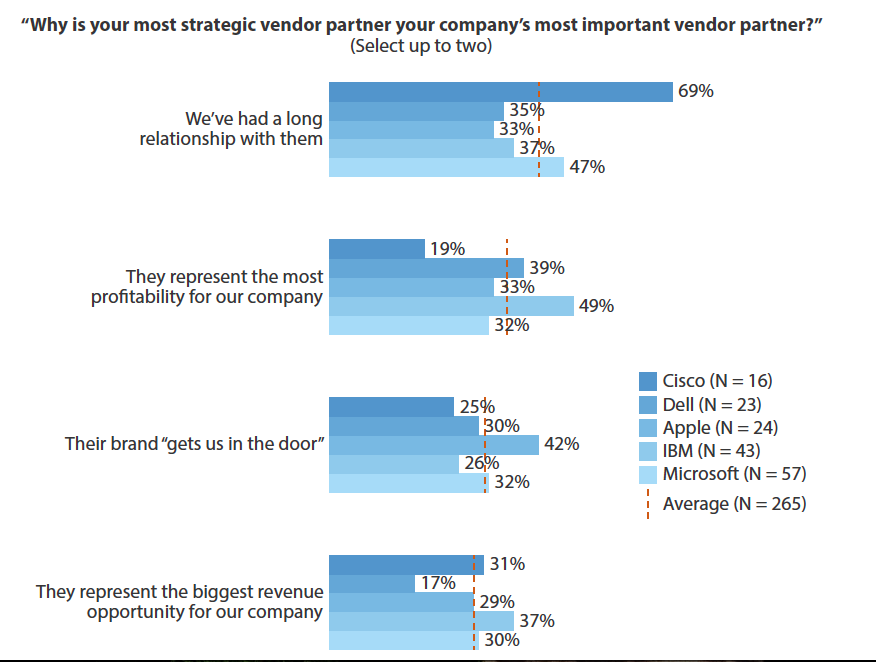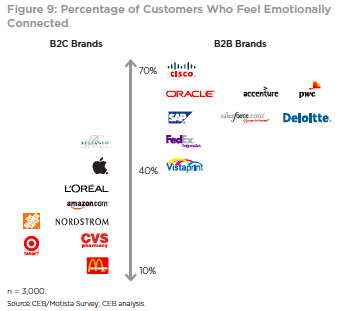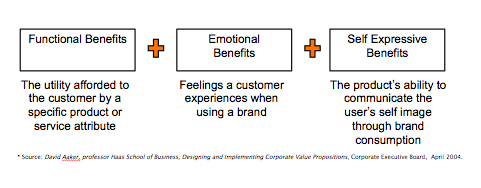Everything We Thought We Knew About B2B Marketing is Wrong
What company do customers feel most connected to emotionally?
Apple? Nope. Amazon? Sorry. It must be Nordstrom’s then, right? Not even close. To find the company that has the strongest emotional connection with customers, you have to leave the consumer world behind. Blows your mind, doesn’t it.
According to new research from Google and the CEB, customers are more emotionally connected to B2B brands, and it’s not even close. The company customers say that they are most emotionally connect to is…Cisco.
Why? Well, it’s about understanding risk. The more risk involved with a purchase decision, the higher the likelihood of an emotional connection. Increase the variables related to risk (e.g. losing a job, wasting corporate investments) and you have the ingredients for an emotionally involved buyer. Personal risks peak when others are counting on you to make the right decision and the stakes are highest.
How did Cisco become number 1? It has to do with Cisco’s ability to reduce risk with buyers. Forrester ‘s Evaluate Your Channel Partner Loyalty Program, surveyed over 250 hi-tech business partners to understand the drivers of loyalty. Partners were asked to select the reason/s “why their most strategic vendor is their most important vendor” (see the table below).
 Partners, buyers of Cisco gear, selected Cisco for the strength of the relationship, despite that fact that Cisco was also the most profitable vendor (established earlier in the research). Cisco partners value the relationship more highly than other partners, 26% more.
Partners, buyers of Cisco gear, selected Cisco for the strength of the relationship, despite that fact that Cisco was also the most profitable vendor (established earlier in the research). Cisco partners value the relationship more highly than other partners, 26% more.
The reason is related to how Cisco is able to create and communicate what the CEB and Google research describes as “personal value” consisting of four parts; professional, social, emotional and self-image benefits. Some of which are communicated, others realized through the customer experience. For example, existing customers understand the “personal value” associated with an existing vendor 2X that of non-customers.
Cisco has built a strong “personal value” equation by investing heavily in their partner’s success. It supports them professionally through training and certification programs. Invest in the brand to support the emotional bond and self-image, and in sales and marketing activities to drive demand.
All of which reduces the risk associate with failure, be it personally or professionally. And in return, they trust Cisco with their livelihood, valuing the “Relationship” above rational drivers, like profits and revenue.
Getting Personal and Emotional
How can we leverage this insight? To start, focus on better communicating “personal value” to non-customers. The research found that brand messaging connects with buyers early on, but the excitement wanes over time as we move down the buyer journey into the evaluation phases.
The rational brain takes over to assess risk, and the complications associated with the purchase, at this point as much as 50% of the potential deals stall or fall out of the process. Risk impacts their initial positive emotions, and unfortunately, we don’t much to help them.
To counter those feelings engage them with personal-value messaging, go beyond just using feature/functionality language (functional benefits) to describe products or services by combining the emotional and self-expressive benefits as well (see below).
Like Cisco, understand how your products or services impact buyers. Does it make them feel “smarter” by having the latest technology, or more “secure” in their role. Although buyers are individuals with unique personalities, and should be treated that way, they most likely share the same fears, uncertainties, and doubts we have in our roles.
Get to know them, like you know yourself. Stop assume they are always rational and buy on price and/or functionality. And finally, realize that there are customers who are emotionally connected to your brand, and/or highly value their relationship with your organization, and when they say that they “love your product or company”…they actually might just mean it.








